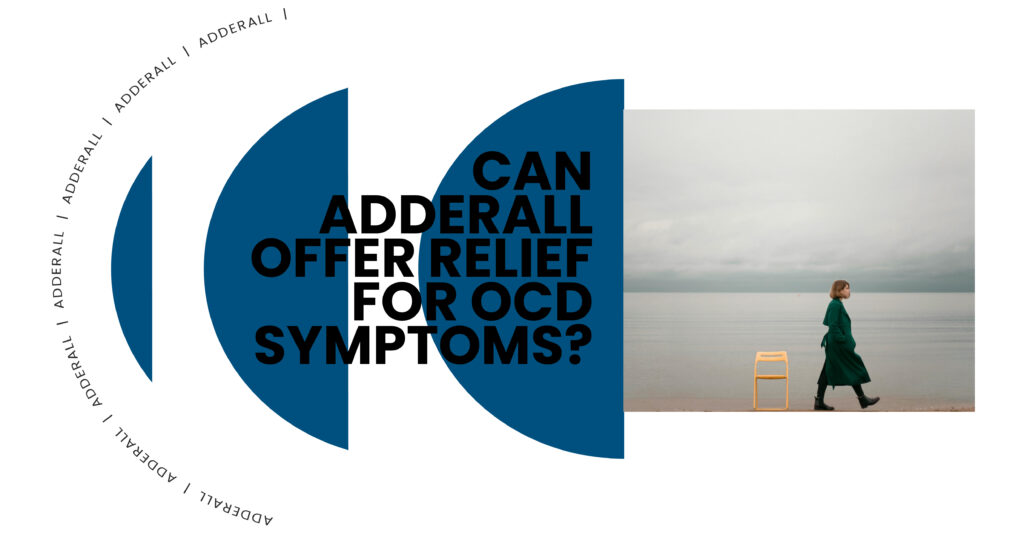Can Adderall Offer Relief for OCD Symptoms?

Authored By:
Raleigh Souther

Edited By:
Chase Mcquown

Medically Reviewed By:
Dr. Alejandro Alva
- Last Updated:

Obsessive-compulsive disorder (OCD) is a chronic mental health condition characterized by intrusive thoughts and repetitive behaviors. For many individuals, finding the right treatment can be a long and frustrating journey.
While traditional treatment typically involves therapy and selective serotonin reuptake inhibitors (SSRIs), some are exploring less conventional paths like using Adderall, a stimulant commonly prescribed for ADHD. But can Adderall help with OCD? And if so, what should patients and clinicians be cautious about?
Let’s explore the complex relationship between OCD and Adderall, from its potential benefits to its risks and the role it may play in a broader treatment plan.
Adderall and OCD: Understanding the Connection
At first glance, using Adderall for OCD might seem counterintuitive. After all, Adderall is a stimulant used to treat attention-deficit/hyperactivity disorder (ADHD), not anxiety-based conditions like OCD. However, the two disorders overlap more than many people realize.
OCD is often associated with excessive mental rumination, repetitive thoughts, and ritualistic behaviors. ADHD, on the other hand, involves inattention, impulsivity, and poor executive function. While they seem like opposites, research shows that up to 30% of individuals with OCD may also have ADHD.
In such cases, using ADHD medication for OCD, such as Adderall, could indirectly help reduce compulsive behaviors by improving attention, focus, and impulse control. However, this approach requires a nuanced understanding and careful medical supervision.
Adderall Side Effects and Their Impact on OCD
Before considering Adderall as a treatment option, it’s essential to examine its potential side effects – especially in individuals already prone to anxiety, which often co-occurs with OCD.
Common Adderall side effects include:
- Insomnia
- Increased heart rate
- Dry mouth
- Loss of appetite
- Nervousness
- Heightened anxiety

These symptoms can exacerbate OCD in some patients. That’s why it’s crucial to approach Adderall use with caution and under professional supervision.
Adderall and Anxiety: Managing Potential Side Effects
Since many people with OCD also experience high levels of anxiety, adding a stimulant like Adderall can be a double-edged sword. While the medication may help with executive functioning, it can also intensify restlessness and intrusive thoughts if not carefully monitored.
To manage this, clinicians may adjust dosage or combine Adderall with antianxiety therapies or medications, or suggest behavioral strategies to reduce anxiety. Some patients may find relief when therapy and Adderall are integrated into a holistic treatment plan, but this varies significantly from person to person.
Comparing OCD and ADHD Symptoms and Treatments
Understanding the differences and similarities between OCD and ADHD is critical in determining if Adderall is a viable treatment.
| Symptom/Trait | OCD | ADHD |
| Intrusive thoughts | Frequent | Rare |
| Repetitive behaviors | Yes | No |
| Inattention | Sometimes | Frequent |
| Impulsivity | Rare | Frequent |
| Anxiety | Common | Possible |
| Response to stimulants | Variable | Variable |
While ADHD responds well to stimulants like Adderall, OCD’s relationship with these drugs is more complex. This highlights why treating comorbid conditions requires individualized care and thoughtful diagnosis.
Adderall’s Effectiveness for OCD Management
So, how effective is Adderall in managing OCD? The research is limited but growing. Anecdotal evidence and small-scale studies suggest that Adderall may help individuals who struggle with both ADHD and OCD, particularly when compulsive behaviors stem from poor impulse control rather than anxiety.
However, the effectiveness for OCD is not yet proven in the broader population. Most psychiatric professionals caution against using stimulants as a standalone treatment for OCD. Instead, they may be used off-label in specific, carefully diagnosed cases where ADHD symptoms are also present.

One small study published in the Journal of Neuropsychiatry found that a combination of stimulants and SSRIs led to greater executive function and reduced compulsions in patients with dual diagnoses. Still, this is far from a definitive endorsement and underscores the need for further research.
Non-Stimulant Treatments for OCD: Alternatives to Consider
If Adderall doesn’t seem like the right path – or if the side effects are too intense – several non-stimulant treatments for OCD have proven effective:
- Cognitive Behavioral Therapy (CBT), especially Exposure and Response Prevention (ERP).
- SSRIs like fluoxetine, sertraline, or fluvoxamine.
- Clomipramine is a tricyclic antidepressant.
- Mindfulness-based therapy.
- Repetitive Transcranial Magnetic Stimulation (rTMS).
- Ketamine therapy, under clinical supervision.
These approaches tend to offer fewer long-term side effects than stimulants and are supported by more extensive clinical evidence. Patients who don’t respond well to traditional therapies may still explore emerging treatments like neuromodulation or psychedelic-assisted therapy, though these remain experimental.
Adderall Dosage for OCD: What You Should Know
If Adderall is being considered as part of a treatment plan, getting the dosage right is crucial. Since it’s not officially approved for OCD, there are no standard dosage guidelines. However, physicians typically start at the lowest effective dose and monitor closely for side effects.
Here are a few points to keep in mind:
- Dosage may differ depending on whether the patient also has ADHD.
- Long-acting (XR) vs. short-acting formulations can affect symptom patterns.
- Daily monitoring and journaling can help evaluate symptom progression.
- Dosage may need adjustment based on therapy progress or other medications.
It’s important to never self-medicate or change dosage without medical consultation, as misuse can lead to dependence or worsen symptoms.
The Role of Therapy When Combining Adderall and Therapeutic Approaches
One of the most effective strategies for OCD management – especially when medication is involved- is combining Adderall and therapy. Cognitive Behavioral Therapy, particularly ERP, is the gold standard. When paired with medication that enhances focus and impulse control, some patients find a more significant reduction in symptoms.
However, therapy also serves as a counterbalance to the stimulant’s side effects. A therapist can help the patient identify whether the medication is causing increased anxiety or compulsive behavior and adjust the treatment plan accordingly.
Family therapy and group counseling may also be beneficial, especially for adolescents or young adults who face social or academic challenges due to their symptoms.
Personalized OCD Support Starts Here: Contact Visalia Recovery Center Today
If you or a loved one is living with OCD and wondering if medications like Adderall could help, the answer isn’t black and white. But you don’t have to navigate it alone. At Visalia Recovery Center, we believe in individualized, evidence-based care that looks at the whole person, not just the diagnosis.
Our compassionate team of mental health professionals will work with you to explore treatment options that fit your specific needs, whether it’s traditional therapy, medication, holistic interventions, or a carefully managed combination. Ready to take the first step toward relief and clarity? Visit Visalia Recovery Center or call us today for a confidential consultation.
FAQs
- How can Adderall help with OCD symptoms, and what are the potential side effects to be aware of?
Adderall may help by improving focus and reducing impulsivity in individuals with co-occurring ADHD and OCD. However, side effects like anxiety, insomnia, and restlessness may worsen OCD symptoms in some cases.
- What are the differences between ADHD medication for OCD and non-stimulant treatments for OCD?
ADHD medications like Adderall are stimulants and may benefit those with both disorders, whereas non-stimulants like SSRIs target serotonin imbalance and are widely accepted for OCD treatment.
- How effective is Adderall in managing OCD compared to other OCD treatment options?
Adderall is not a first-line treatment for OCD and is generally less effective than SSRIs and therapy. It may be helpful in specific cases involving dual diagnoses.
- What should be considered when determining the appropriate Adderall dosage for OCD?
Start with the lowest effective dose under medical supervision and adjust based on symptom response and side effects. Dosage depends on individual factors, including co-existing ADHD.
- What is the impact of combining Adderall with therapy on anxiety and OCD management?
Combining Adderall with therapy can enhance treatment outcomes, especially for attention-related symptoms. Therapy helps manage anxiety and ensures medication is used effectively and safely.


